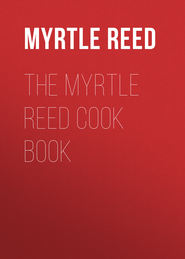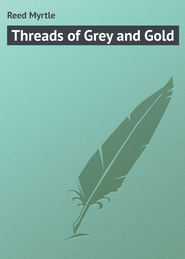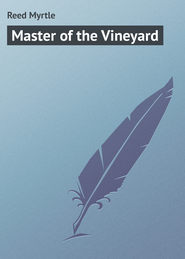По всем вопросам обращайтесь на: info@litportal.ru
(©) 2003-2024.
✖
The Master's Violin
Автор
Год написания книги
2017
Настройки чтения
Размер шрифта
Высота строк
Поля
The after-meetings are often pathetic, between those who have loved in youth. Circumstance parts two who vow undying devotion, and one, perhaps, remains faithful, while the other forgets. Sometimes, both marry elsewhere, each with the other’s image securely hidden in those secret chambers of the heart, which twilight and music serve best to open.
Time, that kindly magician, softens the harsh outlines, eliminates every defect, and, by his wondrous alchemy, transmutes the real to the ideal. Thus in one’s inmost soul is enshrined the old love, with countless other precious things.
Rue lies at the threshold, for Regret, like a sentinel, guards the door, and to enter, one must first make peace with Regret. The labyrinthine passages are hung with shining fabrics, woven of long-dead dreams. The floor is deeply hidden with rosemary, that homely, fragrant herb which means remembrance. The light is that of a stained-glass window, where the sun streams through many colours, and illumines the utmost recesses with a rainbow gleam.
Costly vessels are there, holding Heart’s Desire, which must wait for its fulfilment until immortal dawn. Heart’s Belief is in a chest, laid away with lavender, but the lock is rusty and does not readily yield. Heart’s Love, sweet with spikenard, waits near the door, so eager to pass the threshold, where stands Regret!
Memory’s jewels are there, in many a casket of cunning workmanship, where the dust never lies. Emeralds made of the “green pastures and the still waters”; sapphires that were born of sun and sea. Topazes of the golden glow that comes after a rain; diamonds of the white light of noon. Rubies that have stolen their colour from the warm blood of the heart, gladly giving its deepest love. Amethysts made of dead violets, still hinting that perishable fragrance which, perhaps, like a single precious drop, still lives within, forever out of the reach of decay. Opals made from changeful flame, of irised fancies that lived but for the space of a thought, then passed away. Linked together by a thousand perfect moments, these jewels of Memory wait for the quiet hour when one’s fingers lift them from their hiding-place, and one’s eyes, forgetting tears, shine with the old joy.
The petals of crimson roses, long since crushed and dead, rustle softly from the shadow when the door of the secret chamber opens. Melodies start from the silence and breathe the haunting measures of some lost song. Letters, ragged and worn, with the tint of old ivory upon their eloquent pages, whisper still: “I love you,” though the hand that penned the tender message has long since been folded, with its mate, upon the quiet heart.
When the world has proved forbidding, when love has been unresponsive, and friendship has failed, one steals to the secret chamber with a sense of sanctuary. Past Regret, stern, unyielding, and austere, one goes silently, having given the password, and enters in.
The fragrant herbs and the rose petals bring balm to the tired heart, that heart which has loved so vainly, has tried so faithfully, and failed. The ghosts of dreams, woven in the tapestries that hide the walls, come back to touch the roughened fingers of the one who followed out the Pattern, in the midst of blinding tears. All the music that has soothed and comforted, trembles once more from muted strings. The work-worn hands, made old and hard by unselfish toil, become fair and smooth at a lover’s kiss of long ago. After an hour in the secret chamber, when Mnemosyne, singing, brings forth her treasures, one goes back, serene and fearless, to meet whatever may come.
Margaret came from her secret chamber with a smile upon her lips. In that one hour, she had finally parted with all bitterness, all sense of loss. After twenty-five years of heart hunger and disappointment, she had put it all aside, and come into her heritage of content.
She began to consider Herr Kaufmann again. After all, what was there to be gained? She might be disappointed in him, or he might be disillusioned in regard to her. She remembered what a friend had once told her, years ago.
“My dear,” she had said, “there is one thing in my life for which I have never ceased to be thankful. When I was very young, I fell in love with a boy of my own age, and our parents, by separating us, kept us from making a hasty marriage. I did not forget, but later I met a man who was much better suited to me in every way, whom I liked and thoroughly respected, and of whom my mother approved. But, secretly, I cherished this old love until one day a lucky chance brought me face to face with him. In an instant, the whole thing was gone, and I laughed at my folly – laughed because I was free. I married the other, and I have been a very happy wife – far happier than I should have been had I continued to believe myself in love with a memory.”
There was truth in it, Margaret reflected. She went over to her mirror and sat down before it, to study her face. She was forty-five, and the bloom of youth was gone. The grey threads at her temples and around her low brow softened her face, where Time had left the prints of his passing. Her eyes, that had once been merry, were sad now, and the corners of her mouth drooped a little. She turned away from the mirror with a sigh, wondering if, after all, the dreams were not the best.
Moreover, the womanly instinct asserted itself. To be sought and never to do the seeking, to hold one’s self high and apart, to be earned but never given – this feeling, so long in abeyance, returned to its rightful place.
When the years bring wisdom, one learns to leave many problems to their own working out. Margaret determined not to interfere with the complex undercurrents which, like subterranean rivers, lie beneath our daily living. It might happen or it might not, but she would not seek to control the subtle forces which forever work secretly toward the fulfilling of the law. To live on from day to day, making the best of it, – this is a simple creed, but no one yet has found it unsatisfactory.
Lynn came in and went straight to his room. Margaret heard him walking back and forth, as if in search of something. He tuned his violin and she rejoiced, because at last he had turned to his practise.
But it was not practising that she heard. It was the concerto, every measure of which she knew by heart. With the first notes, she felt a new authority, a new grasp, and began to wonder if it were really Lynn. She leaned forward, her body tense, to listen.
When he came to the adagio, the hot tears blinded her. Lynn, her boy, to play like this! Her mother’s heart beat high in an ecstasy of gratitude for the full payment, the granting of her heart’s desire.
The deep tones stirred her very soul. The passion of it made her tremble, the beauty of it made her afraid. Wondering, she saw the working out of it, – that at the very hour when she had surrendered, had given up, had cast aside her bitterness forever, Lynn had come into his own.
With splendid dignity, with exquisite phrasing, with masterful interpretation, the concerto moved to its end. It left her faint, her heart wildly beating. Through Lynn, Franz had worked out her salvation, her atonement; through Lynn full payment had been made.
When he came out of his room, she was in the hall, her face alight with her great happiness. “Lynn!” she cried. A world of meaning was in the name.
“I know,” he returned, but all the youth was gone out of his voice. At once she realised that he had crossed the dividing line, that, even to her, he was no longer a child, but a man.
He went past her, walked downstairs slowly, and went out. “Poor lad!” she murmured; “poor soul!” Lynn, too, had paid the price – was it needful that both should pay?
But, none the less, the fact remained; the boon had been granted and full payment made, in each instance the same payment. She had paid with long years of heart-hunger, which only now had ceased. Lynn’s years still lay before him.
A sob choked her. Was not the price too high? Must he bear what she had borne for these five and twenty years? With all the passion of her motherhood, she yearned to shield him; to eke out, in the remainder of her days, the remorseless balance against Lynn.
But in the working of that law there is no discrimination – the price is fixed and unalterable, the payment merciless and sure. There is no escape for the individual; it is continually the sacrifice of the one for the many, the part for the whole.
Try as she would, Margaret could not go back. She could not, for Lynn’s sake, take up the burden she had laid down, in the futile effort to bear more. From her, no more would be accepted, so much was plain. The rest must come from Lynn.
Her heart ached for him, but there was nothing she could do, except to stand aside and watch, while his broad shoulders grew accustomed to their load. A wild impulse seized her to go to the city, find Iris, bring her back, even unwillingly, and literally force her to marry Lynn. But that was not what Lynn wanted, and Margaret herself had been forced into a marriage. Clearly, at last, she saw that she must remain passive, and cultivate resignation.
The hours went by and Lynn did not return. She well knew the mood in which he had gone away. At night, white-faced and weary, with his eyes gleaming strangely, he would come back, refuse to eat, and lock himself into his room. It had been so for a long time and it would be so until, through the slow working of the inner forces, he stepped over the boundary that his mother had just crossed.
White noon ascended the arch of the heavens, blazed a moment at the zenith, and then went on. The golden hours followed, each one making the shadows a little longer, the earth more radiant, if that could be.
Upon the hills were set the blood-red seals of the frost. Every maple, robed in glory, had taken on the garments of royalty. The air shimmered with the amethystine haze of Indian Summer, that veil of luminous mist, vibrant with colour, which Autumn weaves on her loom.
Margaret went out, leaving the door ajar for Lynn. There were few keys in East Lancaster. A locked door was discourteous – a reflection upon the integrity of one’s neighbours.
From the elms the yellow leaves were dropping, like telegrams from the high places, saying that Summer had gone. She turned at the corner and went east, the long light throwing her shadow well before her. “It is like Life,” she mused, smiling; “we go through it, following shadows – things that vanish when there is a shifting of the light.”
Across the clover fields, where the dried blossoms stirred in their sleep as she passed, through the upland pastures, stony and barren, with the pools overgrown, through a fallow field, shorn of its harvest, where only the tiny lace-makers spread their webs amidst the stubble, Margaret’s way was all familiar, and yet sadly changed.
A meadow-lark, the last one of his kind, winged a leisurely way southward, singing as he flew. A squirrel flaunted his bushy tail, gave her a daring backward glance, and scurried up a tree. She laughed, and paused at the entrance to the forest.
Once she had stood there, thrilled to her inmost soul. Again she had waited there, white to the lips with pain. Now she had outgrown it, had learned peace, and the long years slipped away, each with its own burden.
The wood was exquisitely still. A nut dropped now and then, and a belated bird called to its mate. The swift patter of fairy feet echoed and re-echoed through the long aisles. The air was crystalline, yet full of colour, and the gold and crimson leaves floated idly back and forth. It needed only a passing wind, at the right moment and from the right place, to make a rainbow then and there.
She went farther into the wood, with a sense of friendliness for the well-known way. Just at the turn of the path, she stopped, amazed. At their trysting-place, where the wide rock was laid at the foot of the oak, someone had reared an altar and blazoned a cross upon the stone.
Her eyes filled, for she knew who had made it, that symbol of sacrifice. Weather-worn and moss-grown, it must have stood for the whole of the five and twenty years. There was no word, no inscription – only the cross, but for her it was enough.
“To kiss the cross, Sweetheart, to kiss the cross!” The last measures of the song reverberated through her memory, as Iris had sung it in her deep contralto, so long ago.
Sobbing, she knelt, with her lips against the symbol, then suddenly started to her feet, for there was a step upon the path.
For a blinding instant, they faced each other, unbelieving, then the Master opened his arms.
“Beloved,” he breathed, “is it thou?”
XX
“Mine Brudder’s Friend”
That day the Master put aside the garment of his years. The quarter century that had lain between them like a thorny, upward path was suddenly blotted out, and only the memory of it remained. Belated, but none the less keen, the primeval joy came back to him. Youth and love, the bounding pulse and the singing heart, – they were all his.
It was twilight when they came away from the moss-grown altar in the forest, his arm around his sweetheart, and the faces of both wet with happy tears.
“Until to-morrow, mine Liebchen,” he said. “How shall I now wait for that to-morrow when we part no more? The dear God knew. He gave to me the cutting and the long night that in the end I might deserve thee. He was making of me an instrument suited to thy little hand.” He kissed the hand as he spoke, and Margaret’s eyes filled once more.
Through the mist of her tears she saw the rising moon rocking idly just above the horizon. “See,” said the Master, “it is a new light from the east, from the same place as thou hast come to me. Many a time have I watched it, thinking that it also shone on thee; that perhaps thy eyes, as well as mine, were upon it, and thus, through heaven, we were united.”
“Those whom God hath joined together,” murmured Margaret, “let no man put asunder.”
“Those whom God hath joined,” returned the Master, reverently, “no man can put asunder. Dost thou not see? I thought thou hadst forgotten, and when I go to keep mine tryst with Grief, I find thee there, with thy lips upon the cross.”











